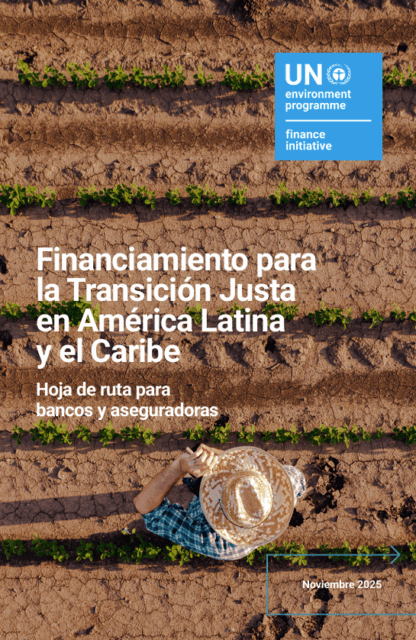
19 December 2023Banking, Climate Change, Impact Centre, Insurance, Investment, Nature, News, Policy, Pollution & Circular Economy, Social
POPULAR CONTENT

19 December 2023Banking, Climate Change, Impact Centre, Insurance, Investment, Nature, News, Policy, Pollution & Circular Economy, Social

18 November 2012News

19 December 2023Climate Change, News
Latin America & Caribbean, Pollution & Circular Economy, Publications | 20 November 2025
The Circular Economy (CE) Finance project in Latin America aims to empower financial institutions to scale up CE investments, particularly benefiting micro, small, and medium-sized enterprises (MSMEs), by addressing systemic barriers, improving taxonomy integration, and building internal capacities of financial institutions.
Climate Change, Latin America & Caribbean, News, Social | 15 November 2025
The transition to a sustainable economy is urgent, but it must be fair to all. This is especially true for Latin America and the Caribbean (LAC): one of the most climate-vulnerable regions facing persistent social inequalities. UNEP FI’s latest report provides practical guidance on how banks and insurers operating in LAC can integrate just transition principles across their organizations.

Climate Change, Latin America & Caribbean, Publications, Social | 15 November 2025
This report provides practical recommendations for financial institutions operating in Latin America and the Caribbean on integrating just transition principles across organizational strategy, governance, internal operations, and the design of financial products and services. It outlines the regional context and showcases examples of public policies, institutional commitments, and financial instruments currently supporting just transition efforts across the region.

Events, Latin America & Caribbean, Policy, Webinars | 24 October 2025
Regional policymakers reflect on the region's implementation of sustainable finance policies, with a focus on the LAC region's alignment and implementation of ISSB IFRS S1 and S2 standards.

COP 30, Events, Insurance, Latin America & Caribbean | 09 October 2025
Convened by the United Nations Environment Programme (UNEP) in partnership with the Brazilian Insurance Confederation (CNseg), the Summit will highlight the ambition and action needed across the insurance, financial, regulatory and supervisory communities—and among policymakers, businesses, scientists and civil society—to accelerate and scale up a just transition to inclusive, resilient and sustainable economies.

Latin America & Caribbean, Publications | 18 June 2025
Esta serie de informes, elaborada por la Iniciativa Financiera del Programa de las Naciones Unidas para el Medio Ambiente (UNEP FI) y CAF - Banco de desarrollo de América Latina y el Caribe - muestra el progreso de las instituciones bancarias nacionales e internacionales que operan en Chile, Ecuador, Perú y Panamá en su camino hacia el desarrollo sostenible.

Events, Latin America & Caribbean | 12 May 2025
UNEP FI y sus aliados estratégicos en la región organizan el Evento de Finanzas Sostenibles en el Cono Sur y…

Events, Latin America & Caribbean | 04 March 2025
The UN Environment Programme Finance Initiative (UNEP FI) hosted its Regional Roundtable on Sustainable Finance for Latin America and the…

Events, Latin America & Caribbean, Pollution & Circular Economy, Training | 09 January 2025
El objetivo de este programa de capacitación es promover el financiamiento de iniciativas de economía circular del sector empresarial en Chile y fortalecer a las instituciones financieras para que puedan ampliar sus carteras en iniciativas de economía circular que contribuyan a la descarbonización del país.

Latin America & Caribbean, Policy, Publications, Sustainable finance taxonomies | 14 August 2024
La Taxonomía de Finanzas Sostenibles de Costa Rica define qué es una inversión ambientalmente sostenible de manera estandarizada, estableciéndose un marco común de referencia que ayuda a los actores de la economía real y del sector financiero de Costa Rica a identificar aquellas inversiones que contribuyen al cumplimiento de los objetivos medio ambientales y sociales del país.
